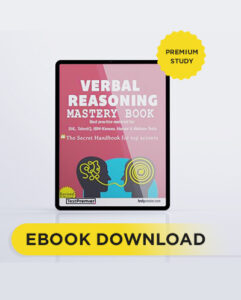Free Verbal Reasoning Mastery Book Updated
Are you ready to unlock the power of verbal reasoning and enhance your cognitive skills? Welcome to our blog post introducing the “Verbal Reasoning Mastery Book,” your ultimate guide to conquering verbal reasoning assessments and excelling in academic and professional settings. we’ll delve into the world of verbal reasoning, explore why it’s essential, and showcase how our book can be your key to success.
Mastering verbal reasoning is a journey that opens doors to success in academics and the professional world. With our “Verbal Reasoning Mastery Book,” you have a comprehensive resource at your fingertips to guide you every step of the way.
The Significance of Verbal Reasoning:
Verbal reasoning is a vital cognitive skill that assesses your ability to understand and evaluate written information, draw inferences, and make informed decisions based on text. It’s an essential skill in various areas of life:
1. Academics: Verbal reasoning is a cornerstone of critical thinking and academic success. It’s crucial for comprehending complex texts, analyzing arguments, and acing exams.
2. Professional Life: In the workplace, verbal reasoning is indispensable. It enables effective communication, problem-solving, and decision-making—skills valued by employers across industries.
3. Standardized Tests: Verbal reasoning assessments are common components of standardized tests like the GRE, GMAT, SAT, and more. High scores in these sections can open doors to educational and career opportunities.
The Verbal Reasoning Mastery Book: Your Ultimate Guide
Our “Verbal Reasoning Mastery Book” is meticulously crafted to help you develop and enhance your verbal reasoning skills. Here’s why it’s your go-to resource:
1. Comprehensive Coverage: The book covers a wide range of verbal reasoning topics, including reading comprehension, critical reasoning, and vocabulary development. It’s your one-stop solution for mastering all aspects of verbal reasoning.
2. Clear Explanations: Each concept is explained in a clear and concise manner. You’ll find step-by-step guidance on how to approach different types of verbal reasoning questions.
3. Abundant Practice: The book is packed with practice exercises and real-life examples. You’ll have ample opportunities to apply what you’ve learned and reinforce your skills.
4. Strategies and Tips: Discover effective strategies and expert tips for tackling verbal reasoning assessments with confidence and precision.
5. Practice Tests: Test your skills with full-length practice tests that mirror the format and difficulty level of real assessments. Detailed answer explanations are provided for self-assessment and improvement.
Who Can Benefit?
Our “Verbal Reasoning Mastery Book” is suitable for a diverse audience:
- Students aiming to excel in academic exams and standardized tests.
- Job seekers looking to sharpen their verbal reasoning skills for interviews and assessments.
- Professionals seeking to enhance their communication and decision-making abilities.
- Anyone interested in boosting their critical thinking and comprehension skills.
Question 1
Being obliged to break confidentiality in a therapeutic relationship is always a direct result of the law.
A. True
B. False
C. Cannot Tell
Solution The law is one reason why someone would have to break confidentiality, but their employment contract is another reason why this could occur. ‘..and it may occur as a result of their employment contract or of the law.’ Answer: B
Question 2
When a client reports their involvement in an act of terrorism, their therapist is legally obliged to report this.
A. True
B. False
C. Cannot Tell
Solution True – the passage states ‘Legitimate breaches of confidentiality relate to circumstances where the information the client has shared relates to acts of terrorism; information of this nature must be reported.’ Answer: A
Question 3
Therapists have some flexibility regarding what they deem serious enough to lead them to breach confidentiality.
A. True
B. False
C. Cannot Tell
Solution The last sentence talks about the fact that ‘individual employers and independent therapists have their own boundaries but must agree this contractually with their client at the outset of the therapeutic relationship.’ This therefore means that they do have some flexibility regarding what they deem to be serious enough. Answer: A
Question 4
Most therapists agree with the conditions the law places on them relating to breaching client confidentiality.
A. True
B. False
C. Cannot Tell
Solution We know that psychotherapists recognize that the law is generally in place to uphold confidentiality but this doesn’t give us any information about whether therapists agree with the law. This therefore makes this a ‘Cannot tell’ answer. Answer: C
Question 5
If a therapist breaches confidentiality about a serious issue without first informing their client of their intentions, they are breaking the law.
A. True
B. False
C. Cannot Tell

